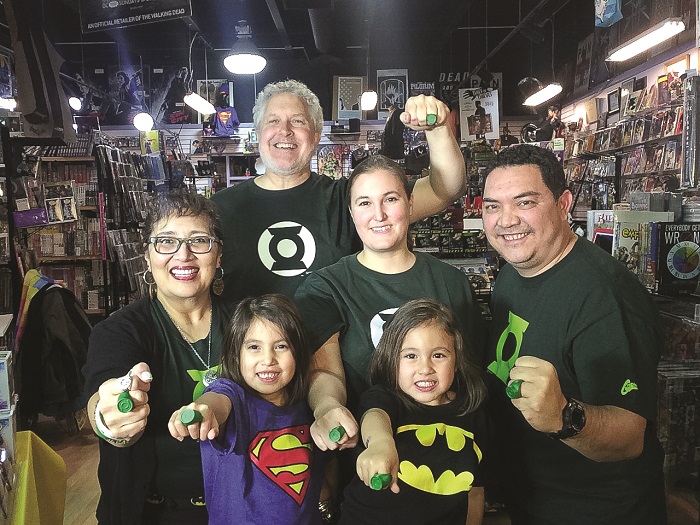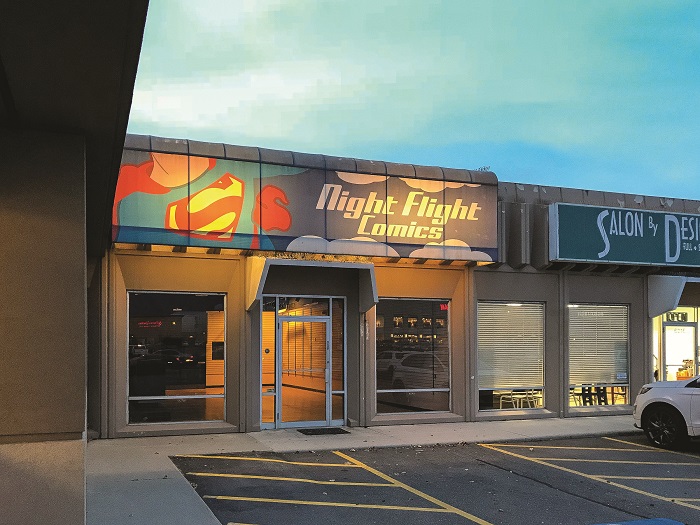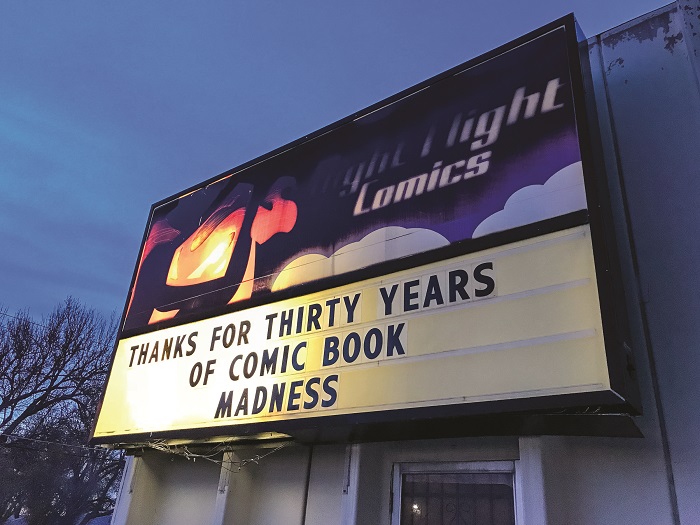
Retail is not for the faint of heart. As the owners of Night Flight Comics, Alan Carroll and Mimi Cruz were retailers for 30 years. They recently decided to shut down their brick and mortar space. And though they are not closing due to lack of profit, as their lease came up for renewal, Alan had to ask, “Do we go for 40? Do we die doing this? What comes next?”
The store first opened in April, 1987, on the upper floor of the now-defunct Cottonwood Mall. They moved to the lower floor a few years later, and eventually to a location on State Street across from Fashion Place Mall. They also had a store at Library Square that closed when the crime rate skyrocketed downtown.
With a strong business background and after working in the corporate world with businesses such as IBM and Conoco, Alan had the idea to open a comic book shop in Salt Lake City. He went to Mimi with his idea and she told him, “If you never do it, you’ll always wonder.” They decided on the space at Cottonwood Mall as a safe, inviting environment.
At the time the store opened in 1987, Alan was working for the Small Business Administration (SBA) helping small businesses get off the ground. As director for the Utah Business Development Center for the U.S. Department of Commerce, he focused on the minority business community.
Through his SBA work, he also became very well acquainted with the statistic that 7 out of 10 businesses fail within the first year, and 9 out of 10 businesses fail within the first five years. Even with those daunting numbers in mind, Alan and Mimi felt they could be successful.
They had enough savings to sustain them for three years in business even if they didn’t make one, single sale. It didn’t come to that because they found the magic sauce.
In the 80s and 90s, comics averaged 75 cents a copy, and they sold hundreds of copies of individual issues. As comic prices rose, they began to sell less copies, but profits remained steady.
How did they succeed when so many other businesses failed? It wasn’t just luck.
The first thing they did was to make sure their store space was inviting, friendly, and clean. Many comic book shops could politely be described as “holes in the wall” where people were reticent to walk in. Night Flight was different. With strategic lighting and inventive displays the store was always inviting. The library store was even featured in an issue of Archie Comics.
A second key factor was building a community. They brought comic lovers together and gave them a home. People came to the store not just to make a purchase, but to have a dialogue about the latest Superman or X-Men comic. Mimi recalls that the day after the 9/11 attack, the store was packed with people who didn’t have anywhere else to go, but felt the need to be with other people they connected with. Alan liked to say, “I built a tree house and invited all my friends to come and play.”
The other keys to their success were a lot of hard work and elbow grease, a desire to excel, honesty and integrity, and a realization that each transaction was important to that particular buyer.
Their passion and love for the medium was something they wanted to share. Mimi established literacy programs using comics, and will continue to donate comics to teachers across Utah and other states, and local libraries.
Alan summed it up. “It was never about the money,” he said. “We both could have made a lot more working somewhere else, it was always about love.”

As they closed down the store in September, they made a decision to open a mail order subscription for their long-time customers. They also referred customers to other local shops that had once been competition. The mail order service came about because so many customers were devastated by the news of their favorite shop closing down. With the same level of care continuing through mail order, the connection will continue.
Besides a desire to try something new, the decision to close was partly based on some industry changes and challenges to retail.
Alan lamented the tax breaks offered in Utah to Big Box and corporate chains with little regard for small, local businesses. There was also fatigue from working with a distributor, Diamond, that has a monopoly in the comic industry. They are the only distributor in the country with no competition. If there is a problem with a shipment or a price increase, the answer seems to be, “What are you going to do about it?”
At one point during their tenure at the Cottonwood Mall they faced a shakedown from shady men who wanted them to pay for garbage removal. Garbage service was already part of their lease at the mall.
It was also increasingly difficult to find quality employees with basic math and reading skills. Mimi would give new employees a stack of comics to alphabetize as a test and many failed it. And the fact is that people are reading less. Alan says, “There is a lack of patience and things move too fast. Social Media has shortened attention spans and people don’t take the time to read anymore.”
As they finally cleaned the last of the boxes and shelves out of the store, Alan and Mimi look forward to a business with no leases, no utilities, no shady shakedowns, and far less headaches.

To see more of Dung Hoang’s work visit his website.

